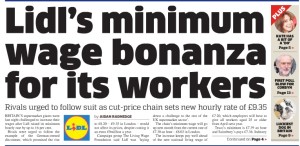I saw this, last week:
Lidl are the first supermarket to go beyond the (UK) minimum wage, and introduce the living wage, grabbing front page headlines in the process.
Asda, Morrisons, Sainsbury’s, and the rest of the crew, will all be under pressure to follow Lidl’s lead.
That aside though, there’s no immediate reason for Lidl to have done this (their rivals didn’t seem to be budging on it). The minimum wage is £6.70 per hour. The living wage is £9.35 in London, and £8.20 elsewhere in the UK.
The article above states that raising wages to this level will cost Lidl £9m per year, but … I bet you it brings more than £9m from new customers, and existing customers spending a little more money.
Consumers are becoming more socially aware – more socially conscious. In a cluttered market place, where lots of supermarket brands are clamouring for our attention, and – roughly – offer the same thing, we just need one of them to give us an extra reason to shop with them. Treating their staff well, by virtue of better wages, is a positive move – it gives people that extra reason; ‘Aah, I like Lidl, they look after their staff’.
Smart move on their part.
Unfortunately, the flip side of this story is the one doing the rounds about particular restaurants holding onto staff tips. These restaurants include well-known brands such as Polpo and Fortnum & Mason. It would seem that they’re hoarding the services charges that should go to their waiting staff, either using that money to top up low wages or simply pocketing it. Either way, it doesn’t look good. It’s terrible publicity.
Again, with so much competition in the market, customers can be picky about where they eat. If a couple, or a group of friends, are choosing a restaurant to go to and they’ve narrowed it down to a list of three, it’d be easy – to make the selection process quicker – to dismiss one, because; ‘Oh not Polpo, they treat their staff like sh*t. They keep the staff tips’.
If a group of people agree, Polpo have then lost maybe £200 that night.
It may be hard at times, when money is tight, but treating staff right may make that 5% difference between someone choosing one brand over another.
